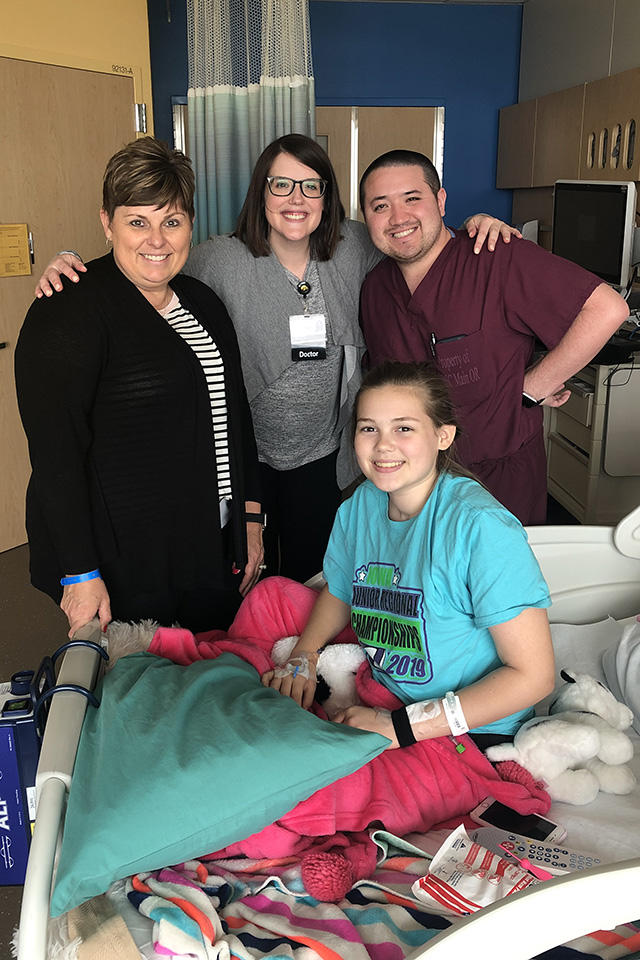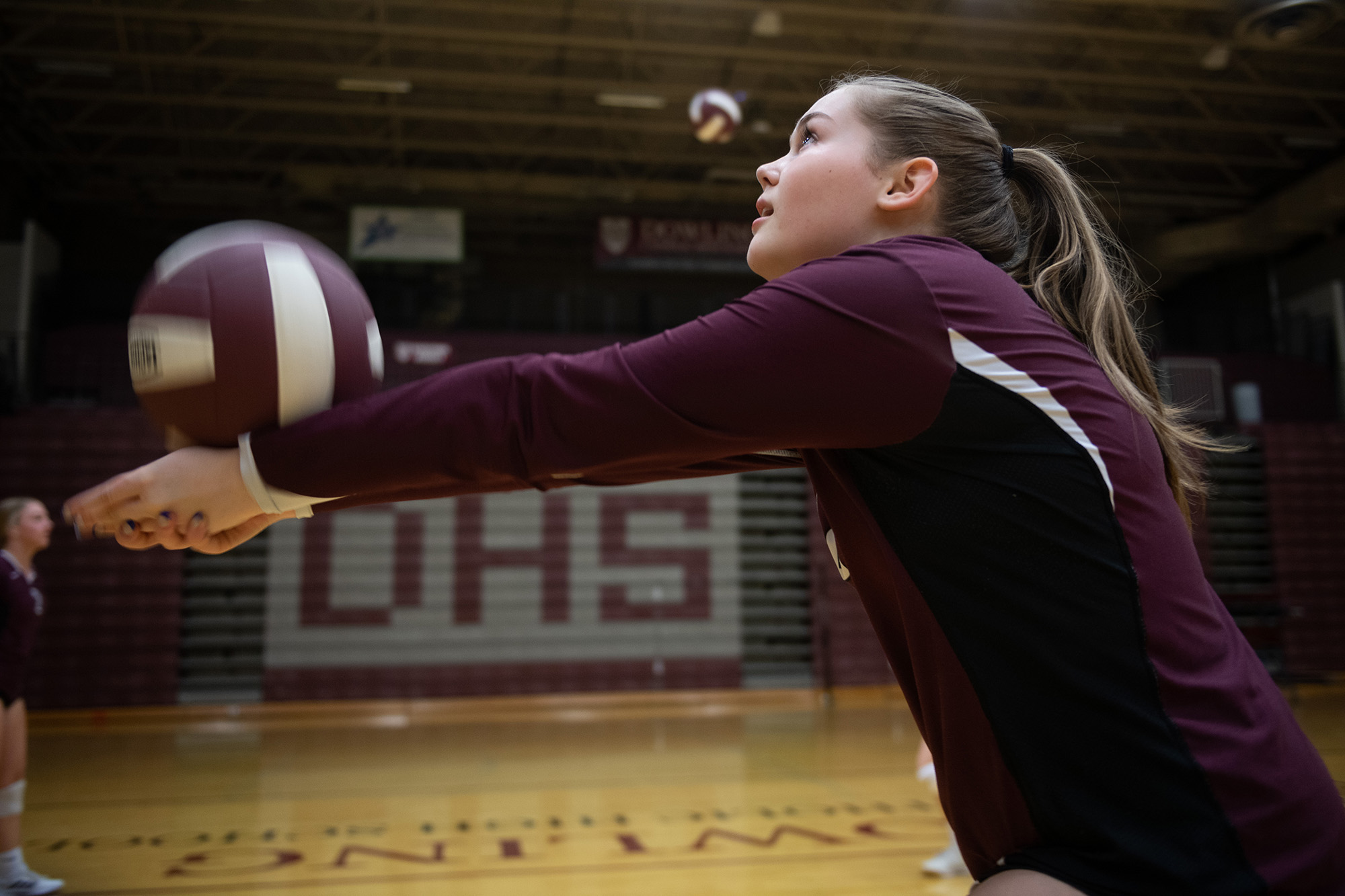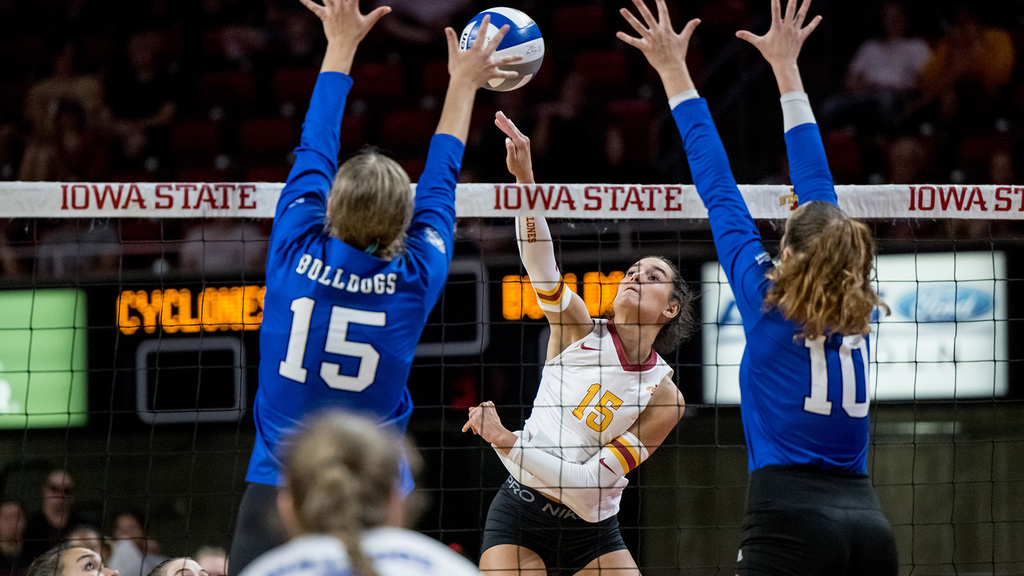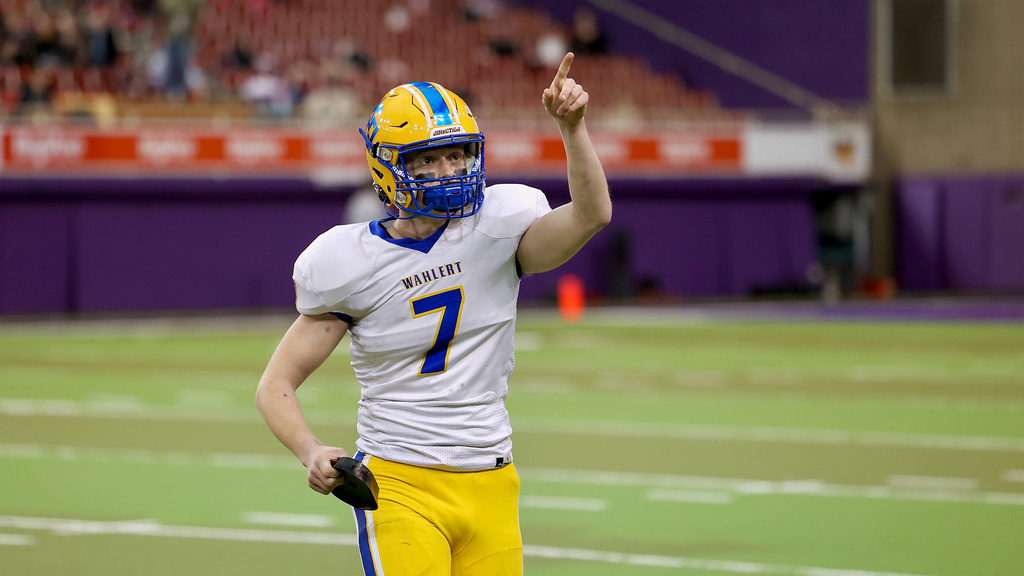After being sidelined by an unusual kidney condition, Lily Calvert of Urbandale, Iowa, is playing volleyball again, thanks to the expertise of University of Iowa pediatric specialists.
Story: UI Health Care Marketing and Communications
Photography: Tim Schoon
Published: Nov. 2, 2021
On her first day of fourth grade, Lily Calvert, of Urbandale, Iowa, had a terrible, unexplained stomachache. Over the next six months, as she lost 30 pounds and grew more and more fatigued, a series of tests could not explain what was making the active 11-year-old so sick.
When routine bloodwork during a follow-up visit uncovered a kidney problem, Lily’s doctor immediately referred her to University of Iowa Stead Family Children’s Hospital, where an ultrasound revealed hydronephrosis, a backup of urine in the urinary tract, an uncommon condition in children.
Led by pediatric urologist Gina Lockwood, MD, and pediatric nephrologist Jennifer Jetton, MD, a team of UI experts in radiology, rheumatology, and pediatric and adult surgery worked to discover what caused the hydronephrosis and to devise a treatment plan. In the end, they preserved Lily’s kidney function with a complex procedure not often performed on children.
After patiently enduring months of treatment, Lily is now back to living the normal life of a teenager, participating in the activities that her illness temporarily stole away from her.
“The best doctors and nurses took care of our daughter and helped her regain her health,” says Amy Calvert, Lily’s mom. “I’m so thankful to the UI Stead Family Children’s Hospital team. Without their expertise and collaboration, our daughter would not be where she is today—two years later, happily back at school and playing volleyball competitively.”
Advanced, compassionate pediatric urology care
Because hydronephrosis is not common in children, Lily’s care team thought a tumor might be the cause.

Lily Calvert and her mom, Amy, pose for a photo with pediatric urologist Gina Lockwood and a resident at UI Stead Family Children’s Hospital. (Photo courtesy of the Calvert family.)
An MRI and a biopsy showed no tumor, but it did uncover retroperitoneal fibrosis, an uncommon inflammatory growth of scar tissue. In Lily’s case, the scar tissue surrounded both ureters—the tubes that drain urine from the kidneys into the bladder—and some important nearby blood vessels.
Amy says Lockwood did an exceptional job of communicating such a complicated and worrisome condition.
“She can explain things in an understandable way and with empathy and a bedside manner like I’ve never experienced,” Amy says.

After enduring months of treatment for an uncommon condition, Lily Calvert (left) is happily back at school and back to living the typical life of a teenager. “The best doctors and nurses took care of our daughter and helped her regain her health,” says Amy Calvert, Lily's mom.
“I’m so thankful to the UI Stead Family Children’s Hospital team. Without their expertise and collaboration, our daughter would not be where she is today—two years later, happily back at school and playing volleyball competitively.”
Even during difficult times, Lily ‘just rolls with it’
Because the condition is so rare in children, Lockwood and Jetton consulted with other UI specialists including pediatric rheumatologist Polly Ferguson, MD, to determine the best course of action to encourage the fibrosis to shrink and to repair the kidney drainage problem as soon as possible to prevent longer-term issues from developing.
Interventional radiologists inserted two nephrostomy tubes to allow urine to empty into a small bag that Lily wore like an ostomy bag.
Amy and her three sisters came up with the idea of making shoulder bags that Lily could wear over the ostomy bag, and a family friend used her seamstress expertise to make the bags. The bags protected the ostomy bag and the drainage tubes while also serving as cute accessories.
At school, Lily spent a lot of time in the nurse’s office, mostly getting her urine output measured. She quit all sports, including volleyball.
“It was tough for Lily because she’s very active,” Amy says. “Most kids would be embarrassed by it all, but she’s not. She just rolls with it and trusts God has a plan for her.”
Two expert urology teams work together for the best outcome
After the first surgery, Lily took medications to help decrease inflammation in the scar tissue. Her condition improved, but the medicine did not completely resolve the condition.
A complex surgery offered a permanent solution, but it was a procedure most often used for adult patients. Lockwood called on UI urologic surgeon Chad Tracy, MD, to contribute his expertise in the minimally invasive robot-assisted procedure that Lily needed.
Lockwood says the close relationship between the UI Stead Family Children’s Hospital pediatric urology team—which includes the only four pediatric urologists in Iowa—and the UI’s adult urology team offers unique benefits, especially for patients like Lily who require highly specialized care.
“We often collaborate with our colleagues in adult urology for complex cases to best maximize our experience,” Lockwood says.
In 2019, in a six-hour procedure, Tracy and Lockwood worked together to successfully remove the scar tissue that remained. Tracy carefully separated the tissue from the ureters and then repositioned the ureters to protect them from future tissue growth. Lockwood inserted plastic stents to temporarily connect the bladder to the kidneys while the ureters healed.
Lily’s care team will continue to see her periodically to check her kidney function.
“We are monitoring Lily to make sure the kidneys are draining, to make sure this doesn’t cause problems as she continues to grow,” Lockwood says.

At one point, Lily Calvert had to give up playing sports, including volleyball. Following a complex surgical procedure to address Lily's condition, Lily is back on the volleyball courts once again.
Family-centered pediatric care plays a crucial role
Today, Lily’s energy level is back, and she’s playing volleyball again.
Amy and her husband, Pat, are grateful for all of the expert care Lily has received along the way. But when she thinks back to those long months of trying to determine what was making Lily’s health deteriorate so drastically, she’s reminded of the role the family plays in always making sure a child gets the best available care.
“You have to be an advocate for your child,” Amy says. “You can’t be afraid to ask questions, work with the doctors to learn all you can, read the research, get a second opinion, trust, and have faith, and don’t stop until you get an answer that in your gut feels right.”



